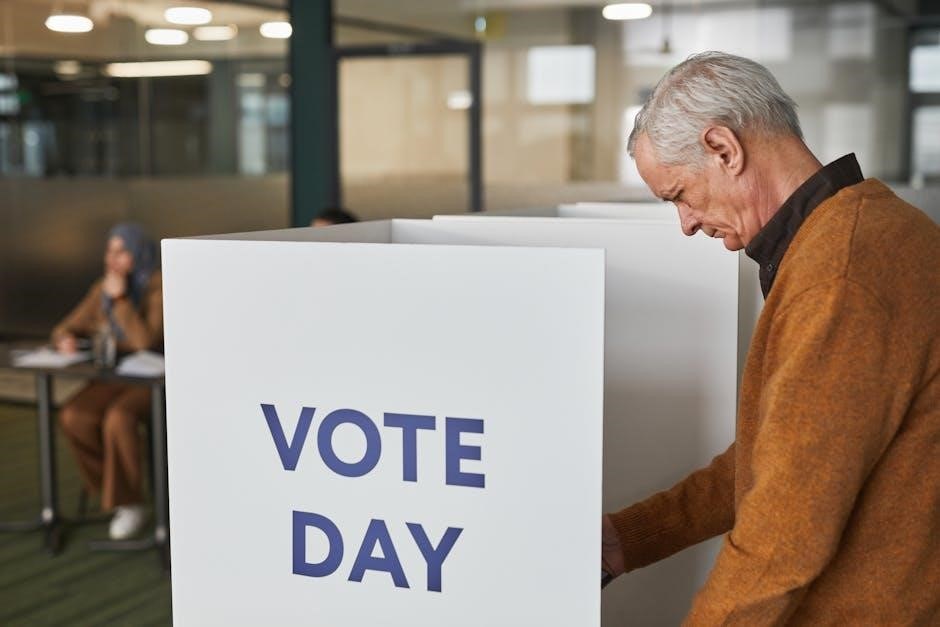We the People: The Citizen and the Constitution is a national civic education program developed in 1987. It focuses on teaching the history, principles, and evolution of American constitutional democracy, aiming to promote civic competence and responsibility among students.
Overview of the Program’s Mission and Goals
The mission of We the People: The Citizen and the Constitution is to promote civic competence and responsibility among students by teaching the history, principles, and evolution of American constitutional democracy. Developed in 1987, the program was adopted by the Commission on the Bicentennial of the U.S. Constitution, chaired by Chief Justice Warren E; Burger. It serves elementary, middle, and secondary students, focusing on the U.S. Constitution, Bill of Rights, and founding documents. The program aims to enhance students’ understanding of their roles as citizens and prepare them to participate actively in democratic processes, fostering a deeper appreciation for constitutional governance.
Historical Background and Development of the Program
We the People: The Citizen and the Constitution was developed in 1987 by the Center for Civic Education. It was created to coincide with the bicentennial of the U.S. Constitution, serving as the principal education program for the celebration. The initiative was championed by Chief Justice Warren E. Burger, who recognized the need for comprehensive civic education. The program was designed to educate students about the Constitution’s history, principles, and relevance, ensuring future generations understand their role in maintaining constitutional democracy. Its development marked a significant milestone in civic education, aligning with the nation’s commitment to fostering informed and engaged citizenship.

The Structure and Curriculum of the Program
We the People features a comprehensive curriculum divided into units, covering the history, principles, and civic responsibilities tied to the U.S. Constitution, with exercises and Supreme Court cases.
Key Units and Levels of the Curriculum
The curriculum is divided into six units, each focusing on different aspects of constitutional democracy. Level 1 covers foundational concepts, while higher levels delve into civic responsibilities and historical evolution. The program is tailored for elementary, middle, and high school students, ensuring age-appropriate learning. Each unit includes primary sources, Supreme Court cases, and interactive exercises to enhance understanding. The curriculum emphasizes critical thinking, civic engagement, and the application of constitutional principles to real-life scenarios. Regular updates incorporate new cases and contemporary issues, ensuring relevance and depth. This structured approach fosters a comprehensive understanding of the Constitution and prepares students for active citizenship.
Teaching Methods and Materials
The program employs interactive methods, including simulations, debates, and primary source analysis, to engage students. Materials like the We the People textbook, digital tools, and a teacher’s guide provide structured lessons. The curriculum incorporates Supreme Court cases and historical documents to deepen understanding. Interactive exercises encourage critical thinking and civic discussion, preparing students for competitions and hearings. These resources foster a dynamic learning environment, equipping students with the knowledge and skills necessary for informed citizenship and active participation in democracy.

The Importance of the U.S. Constitution
The U.S. Constitution is the foundation of American democracy, outlining the framework of the federal government and the rights of citizens. It ensures a constitutional government, separating powers, and providing checks and balances, protecting individual freedoms, and promoting unity among states. Its principles have shaped American institutions and practices, influencing governance and civic life. The Constitution’s enduring relevance lies in its adaptability through amendments, reflecting the nation’s growth and commitment to justice and equality. It remains a cornerstone of civic education, fostering understanding of democratic values and responsibilities.
Founding Principles and Evolution of the Constitution
The U.S. Constitution, established in 1787, is rooted in principles like democracy, federalism, and the rule of law. It ensures individual rights and balances power among government branches. Over time, amendments such as the Bill of Rights and the Reconstruction Amendments have expanded rights and representation. Supreme Court decisions have further interpreted its provisions, adapting to societal changes. This evolution reflects the nation’s commitment to justice and equality, making the Constitution a living document that guides American democracy while remaining relevant to modern challenges.
The Role of the Constitution in Modern American Society
The U.S. Constitution remains the cornerstone of American democracy, shaping laws, policies, and societal values. It ensures individual rights, separation of powers, and federalism, influencing modern debates on equality, justice, and governance. Through amendments and judicial interpretations, it adapts to contemporary challenges while maintaining foundational principles. The Constitution’s relevance is evident in its impact on public discourse, education, and civic engagement, fostering a sense of national identity and unity. Its principles guide institutions, ensuring accountability and representation, and it continues to inspire efforts toward a more equitable society, making it indispensable in modern American life.

Citizenship and Civic Education
Citizenship and civic education emphasize understanding rights, responsibilities, and democratic participation. Programs like We the People foster civic competence, enabling students to engage effectively in governance and society.
Defining Citizenship and Its Responsibilities
Citizenship is defined as the status of being a member of a nation, granting rights and responsibilities. In the U.S., this includes voting, paying taxes, and jury service. Responsibilities extend to civic engagement, such as participating in public hearings and understanding constitutional principles. The We the People program emphasizes the importance of informed citizenship, teaching students to analyze governance and apply constitutional values. By fostering civic literacy, the program prepares students to fulfill their roles as active citizens, ensuring the continuation of democratic ideals and practices in American society. Citizenship is not just a legal status but a commitment to community and democracy.
The Impact of Civic Education on Democracy
Civic education plays a vital role in strengthening democracy by equipping citizens with the knowledge and skills to participate effectively. Programs like We the People: The Citizen and the Constitution foster critical thinking, civic engagement, and an understanding of constitutional principles. By educating students about their rights and responsibilities, civic education prepares them to hold elected officials accountable and contribute to informed decision-making. This empowerment ensures the continuation of democratic ideals and the active involvement of citizens in shaping their communities. Informed citizens are better equipped to address societal challenges, promoting a resilient and functioning democracy for future generations.
Competitions and Community Engagement
We the People fosters civic engagement through state and national competitions, where students demonstrate constitutional knowledge. Public hearings and community participation further enhance democratic understanding and active citizenship;
State and National Competitions
We the People features state and national competitions where students demonstrate their understanding of the Constitution. These events simulate congressional hearings, with students testifying as expert witnesses on constitutional topics. Teams from schools across the U.S. compete, showcasing their civic knowledge and critical thinking skills. The competitions culminate in a national championship, highlighting the program’s effectiveness in fostering civic engagement and constitutional literacy. These events not only promote academic excellence but also inspire students to become active, informed citizens, equipped to participate in democratic processes.
Public Hearings and Student Participation
Public hearings are a cornerstone of the We the People program, allowing students to engage in mock congressional hearings. Students are divided into units based on the curriculum and prepare formal statements and answers to questions. These hearings simulate real-life civic participation, fostering critical thinking and public speaking skills. Students testify on constitutional topics, demonstrating their understanding of founding principles and modern applications. This interactive approach encourages active citizenship and provides a platform for students to voice their perspectives on governance and democracy. The hearings also serve as a practical application of civic education, preparing students for future civic engagement.

Resources and References
The program offers a variety of resources, including the We the People PDF, which provides a comprehensive curriculum and supplementary materials for civic education.
Additional resources include the Center for Civic Education’s publications, such as The Constitution and Other Essential Documents, and online tools for interactive learning experiences.
Recommended Reading and Digital Tools
The program offers a range of resources, including the We the People: The Citizen and the Constitution PDF, which serves as a primary textbook. Supplementary materials like The Constitution and Other Essential Documents of American Democracy provide historical context. Digital tools, such as the We the People Resource Center, offer interactive lessons and multimedia content to enhance learning. For advanced study, the Founders’ Constitution and online archives of constitutional debates are recommended. These resources are designed to support teachers and students, fostering a deeper understanding of civic principles and their application in modern society.
Additional Materials for Deeper Understanding
For further exploration, the program offers a wealth of supplementary materials. The We the People: The Citizen and the Constitution PDF includes in-depth units, such as Level 3, which explores advanced concepts of constitutional democracy. Additional resources like American Governance provide detailed analyses of key constitutional principles. Interactive activities, such as mock congressional hearings and civic participation exercises, enhance practical understanding. The program also incorporates primary sources, including founding documents and Supreme Court cases, to offer a comprehensive view of constitutional development. These materials are designed to engage students and educators, fostering a deeper appreciation of civic responsibility and constitutional ideals.
We the People: The Citizen and the Constitution is a cornerstone of civic education, empowering students to understand and engage with constitutional democracy effectively, fostering informed citizenship and preparing them to participate actively in shaping the future of American democracy.
The Significance of Civic Competence in the 21st Century
Civic competence is essential in the 21st century as it empowers individuals to navigate complex societal challenges and participate meaningfully in democracy; We the People: The Citizen and the Constitution equips students with the knowledge and skills to understand constitutional principles, fostering informed decision-making and active citizenship. In an era of rapid change, civic competence ensures that future generations can address contemporary issues, such as misinformation and social inequality, while upholding democratic values. By promoting civic literacy, the program strengthens individuals’ ability to contribute to a functioning democracy and maintain the balance of power in a constitutional government.